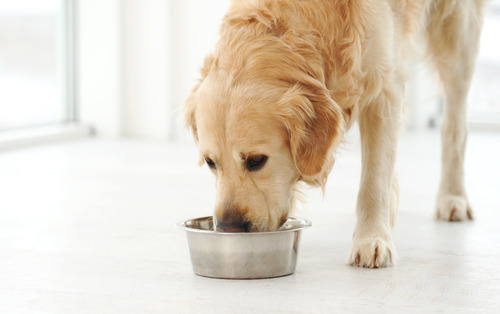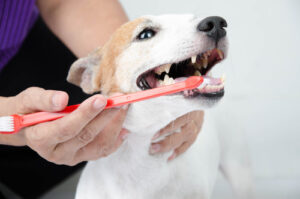As a pet owner, you want to make sure your dog is healthy and happy, so when you notice an unusual behavior like excessive water drinking, it’s natural to be concerned. While it’s normal for dogs to drink water throughout the day, increased thirst can sometimes be a sign of underlying health issues. If you’re worried about your dog’s health, please call Pet Townsend Veterinary Clinic at (360) 379-1133 or request an appointment online.
What Causes Increased Thirst in Dogs?
Excessive thirst, known as polydipsia, can occur for a variety of reasons. While some causes are relatively harmless, others may require veterinary attention.
Normal Physiological Reasons
Dogs, like humans, experience variations in their water intake based on several normal physiological factors. Warmer weather, increased physical activity, and certain dietary changes can all lead to a temporary increase in thirst.
- Weather: During hot or humid weather, dogs may drink more water to help regulate their body temperature and stay hydrated.
- Exercise: Dogs that are more active or engage in strenuous physical activities may naturally require more water to replenish lost fluids.
- Diet: A diet high in sodium or dry kibble may cause your dog to drink more water to balance their body’s needs.
These reasons are usually harmless, but if your dog’s increased water intake persists, it may be time to consider other causes.
Potential Medical Conditions Linked to Excessive Thirst
When a dog’s thirst doesn’t seem to be related to the factors mentioned above, it might be indicative of an underlying medical condition. Here are some of the most common health issues that could cause your dog to drink more water than usual.
Diabetes Mellitus
Diabetes mellitus is a condition where the body cannot effectively regulate blood sugar levels. When blood sugar levels are high, the kidneys work harder to remove the excess sugar, leading to more frequent urination. As a result, your dog may drink more water to compensate for the loss of fluids. This is one of the early signs of diabetes in dogs. If your dog is also showing symptoms such as increased urination, weight loss, or lethargy, consult with your veterinarian.
Kidney Disease
The kidneys play a crucial role in filtering waste from the bloodstream and maintaining fluid balance. When the kidneys aren’t functioning properly, your dog may drink more water as their body struggles to eliminate toxins. In addition to excessive thirst, symptoms of kidney disease may include increased urination, decreased appetite, vomiting, and weight loss.
Cushing’s Disease
Cushing’s disease, or hyperadrenocorticism, occurs when the adrenal glands produce too much cortisol. Elevated cortisol levels affect the kidneys’ ability to concentrate urine, leading to increased urination and, subsequently, an increase in water consumption. This condition can lead to a variety of symptoms, including increased thirst, excessive panting, and a pot-bellied appearance.
Behavioral Causes of Excessive Thirst in Dogs
In some cases, a dog’s increased thirst may be related to behavioral issues rather than physical health problems.
Boredom and Anxiety
Just like humans, dogs can develop habits out of boredom or anxiety. If your dog is left alone for extended periods or is not getting enough mental or physical stimulation, they may resort to drinking more water as a way to pass the time or cope with stress. Providing your dog with adequate exercise, interactive toys, and companionship can help reduce boredom and anxiety. If you suspect your dog’s increased thirst is linked to stress, consider consulting with a professional dog trainer or behaviorist.
Compulsive Drinking
Some dogs develop compulsive behaviors, including excessive drinking, as a result of underlying anxiety or obsessive-compulsive tendencies. This behavior can become problematic if it leads to water intoxication or disrupts their normal routine. If your dog seems to be drinking water excessively and without apparent reason, monitor their behavior closely. If the drinking seems to be out of control, consult with your veterinarian at Pet Townsend Veterinary Clinic to rule out medical causes and discuss potential behavioral interventions.
When to Seek Veterinary Care for Excessive Thirst
While occasional increases in water intake may not be a cause for concern, persistent excessive thirst should be evaluated by a veterinarian. If your dog is drinking a lot of water and you’re not sure whether it’s normal, consider the following questions:
- Has your dog’s water intake increased suddenly or gradually?
- Is your dog also experiencing increased urination, changes in appetite, or other unusual symptoms?
- Does your dog seem lethargic, weak, or disoriented?
- Has there been a recent change in diet, environment, or activity level that could explain the increase in thirst?
If you answer “yes” to any of these questions, it’s time to contact Pet Townsend Veterinary Clinic for a thorough examination.
How Pet Townsend Veterinary Clinic Can Help
At Pet Townsend Veterinary Clinic, our team is equipped to diagnose and treat the underlying causes of your dog’s increased thirst. Through a combination of physical exams, blood tests, and other diagnostic tools, we can identify whether your dog’s thirst is due to a medical condition, dietary factor, or behavioral issue.
Depending on the cause of your dog’s excessive thirst, treatment may involve managing an underlying health condition, adjusting their diet, or addressing behavioral factors. Your veterinarian will work with you to develop a tailored plan that best supports your dog’s well-being. For any concerns about your dog’s water intake, or if you notice other worrisome symptoms, call Pet Townsend Veterinary Clinic at (360) 379-1133 or request an appointment online.






